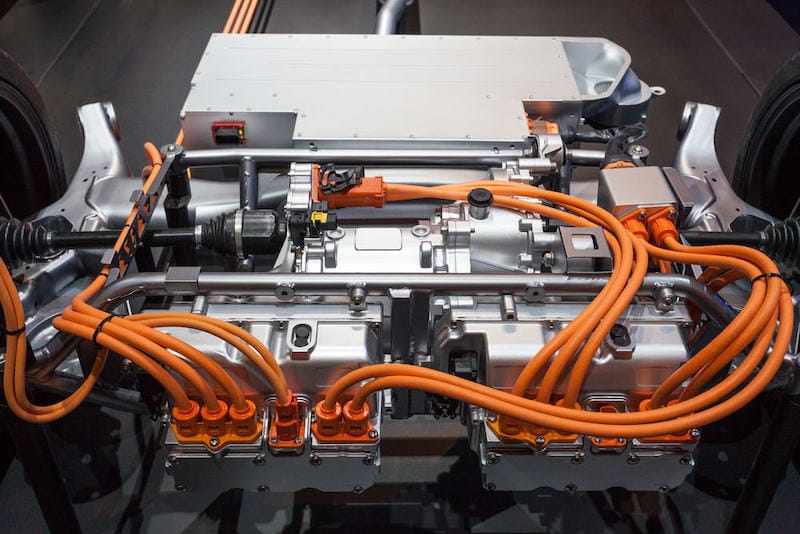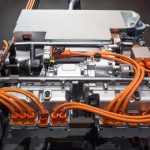The PCM is the main computer module the vehicle uses to run the engine management systems and control vehicle emissions. The PCM directly controls the fuel injectors and the coils, determining the fuel mixtures and timing based on sensor inputs and it’s basic programming. “PCM” stands for “powertrain control module”, which is used interchangeably with “ECM” or “electronic control module”; they’re the same thing. A PCM typically has hundreds of tasks it must perform consistently and correctly, so while they are ordinarily very reliable and often last the life of a vehicle, there are many ways for one to fail.
The PCM, like most computers, needs to keep cool, so most of the time it’s out in the open and pretty accessible. They’re fairly easy to remove and install, but then once a new PCM is installed there are various things that need to be programmed and registered, including security features to protect the vehicle from theft. That part of the job is sometimes only possible with factory interface tools, and most often is done or at least completed at a dealership. On some older models, the PCM could be taken from one vehicle and swapped into another and it would work fine, but most newer vehicles have security keys and vin-locked or vin-specific programming, so a used PCM will not work on any vehicle but the one it was originally programmed to. And many new PCM’s won’t function until programmed to the specific vehicle.
In many cases, the most cost-effective thing can be to send the original PCM in to be repaired or remanufactured. This avoids the programming and vin-matching issues, as a repaired unit will work fine in the vehicle it originally came out of. Many PCM remanufacturers can be found with prices averaging from $150 to $250.
Costs of PCM Replacement
On average it costs about $300 to send out a PCM on most vehicles and have it repaired or about $600 to replace the PCM. This is in addition to whatever diagnostic charges were necessary to get to that point, which can be unpredictable.
For some more specific estimates on the cost of PCM replacement on common vehicles, using $100 an hour as a labor rate:
For a 2009 Nissan Altima with a 2.5 liter engine, the labor time to replace the PCM is 1.2 hours, installation, and programming taken together. A factory PCM costs about $950, or remanufacturing the unit costs about $250. This makes the job about $1070 using factory parts, or about $370 to remanufacture.
For a 2006 Honda Accord with a 3.0 liter engine, the labor time to replace the PCM is 1.1 hours, installation, and programming. A new factory PCM costs about $933, or remanufacturing the unit costs about $250. This makes the job about $1043 using factory parts, or about $360 to remanufacture.
For a 2013 Dodge Dart with a 1.4 liter engine, the labor time to replace the PCM is 1 hour. A factory PCM costs about $625, or remanufacturing the unit costs about $250. This makes the job about $725 using OE parts, or about $350 to remanufacture.
All of these estimates would be in addition to diagnostic charges.
Things to Keep in Mind During PCM Diagnosis

All the estimates above are for basic repair or replacement of the part, but there is no simple path to knowing that a PCM needs repaired or replaced. Diagnosis can be very complicated and time-consuming. Aside from physical damage, the easiest case might be where a vehicle won’t start or run, and the PCM will not communicate with a diagnostic tool. Then the steps are – check fuses, verify powers and grounds at the PCM, verify the wiring to the OBDII port. If all that’s good, then it’s probably a bad PCM.
It’s pretty difficult to be certain in other cases, and it’s very easy to be wrong. In the above example, for instance, a faulty crank sensor and a broken bus communications wire between the PCM and the OBDII port could cause the same symptoms. In many cases what is required is exhaustive checks of the wiring, which is only possible if a pretty thorough wiring diagram is obtained. And in many cases, it’s tempting to just replace the PCM rather than engage in complicated wiring checks, in spite of the PCM only rarely being the actual problem.
Otherwise, the best strategy is often to focus down on one single thing the PCM should be doing but isn’t doing, and then rule out other possible causes. In another example, for many vehicles, the PCM provides constant power to each coil and then fires the coils by breaking the ground side of the circuit. A misfire can be caused by a faulty low-side (ground) driver in the PCM, but that’s still the least likely cause in practice. Usually, diagnosis is only arrived at after coils and plugs are ruled out, engine compression is checked, fuel injectors and vacuum leaks are ruled out, and the camshaft is determined to be in good shape. All of which can take up 3 or 4 hours of diagnostic time, after which the wiring is checked, and then the PCM becomes a suspect.
Practically speaking, the main problems that arise during PCM replacement are related to the difficulties of diagnosis. All the information necessary isn’t always available, sometimes parts are replaced that aren’t entirely necessary, and sometimes the PCM is replaced when it doesn’t need to be. Remanufacturers have long benefited from a consistent unnecessary replacement rate of about 50%; which is to say, about half of the PCMs replaced have nothing wrong with them. Wiring problems are particularly difficult to rule out, and it’s not uncommon to have the first try at a repair being replacing parts, the second try is replacing the PCM, and the third try being a wiring harness repair or replacement.
The best approach is to first make sure that the shop doing the job is comfortable and familiar with electrical work and to allow them the necessary time to diagnose the problem. If a shop seems in over their head, can’t explain the diagnostics they are doing, or doesn’t have the expertise or information to complete a repair, then sometimes it’s best to find another shop. If a mechanic suggests that they aren’t up to the task, it’s usually best to believe them. There are plenty of otherwise excellent mechanics and reliable shops that don’t have the expertise to diagnose complicated electronic systems, and it can waste a great deal of time and money trying to fix a problem without the necessary background and information.
FAQ
Yes. It will usually come with basic programming, but in almost all cases of newer vehicles there will be security information and a other details to program in.
An hour or less, but the process of ruling out other possibilities can take much longer, days sometimes.
Generally, that doesn’t work. On some vehicles (usually model year 2000 or prior vehicles) it’s possible, but most PCMs are linked to the vehicle and its other modules, and can’t be reprogrammed for another vehicle.

